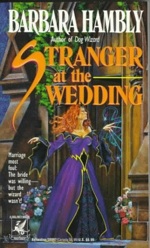In a discussion once about “fantasy of manners,” I mentioned Barbara Hambly’s Stranger At The Wedding (UK title Sorcerer’s Ward) and discovered that almost nobody else had read it. It’s an entirely stand-alone novel in the world of the Antryg Windrose books, with no overlap of significant characters. It’s a romantic comedy, it’s a mystery, and it’s a fantasy novel set in a world on the edge of industrialisation. The romance is never cloying, the integration of magic with the history and traditions of the world is flawless, and the world is fascinating.
All that is pretty much what I expect from Hambly. I like almost all her fantasy, and her historical novels as well. What makes this book special is the deftness of touch that whisks it into the fantasy-of-manners subgenre. I often don’t find comedy funny, but when humour arises out of character and situation it can catch me just right, and Stranger at the Wedding tickles me just the right way. It’s funny and frothy with wonderful characters and solid worldbuilding. No wonder I love it and read it at regular intervals. It isn’t a demanding book, but it’s a lovely one.
Magic isn’t respectable, and Kyra gave up being the respectable daughter of a merchant family with pretensions years ago. When she finds out in a practise scrying session that something terrible is going to happen to her little sister on her wedding day, she has to go home to stop the wedding. Kyra’s used to being independent, and she has to go back–at least temporarily–into dependence. She’s used to using magic, and she has to stop doing it, at least openly. She has to prevent disaster coming to her sister, holding off the wedding with ever more contrived postponements, and she has to appear to comply with the conventions while trying to find out what the disaster is, who’s causing it, and why. There’s lots of scheming, there’s an elopement, there’s the unexpected discovery of true love, and there’s magic to make everything more complicated. The satisfying and convoluted plot resolution reminds me in some ways of Georgette Heyer’s The Grand Sophy.
As for the world, it has plausible economics, well-integrated magic and advancing technology. It has a city that feels like a city, and a class system that isn’t just aristocrats and scum. I swoon.
I know that online the answer to any question that starts “Am I the only one who…” is always “no,” so I’ll ask confidently not whether I’m the only one who liked this book, but who else liked it?










